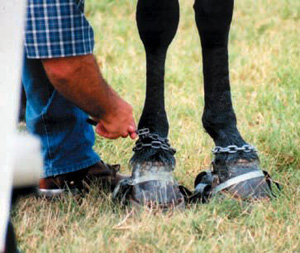
By Monica Vendituoli | Open Secrets blog
A bill introduced in April to end the practice that gives Tennessee walking horses their distinctive gait brought the American Veterinary Medical Association (AVMA) and the American Association of Equine Practitioners (AAEP) to the Capitol last week to give a presentation on horse “soring.”
Anything with a name like that seems unlikely to be a happy experience, right? As it turns out, some walking horses don’t come by their high-stepping naturally or with the usual kind of training. Sometimes, it’s the result of kerosene, mustard oil and other irritants, as well as heavy boots, chains and collars, applied to the horses’ hooves and lower legs.
The Prevent All Soring Tactics Act (H.R. 1518, or the PAST Act), sponsored by Rep. Ed Whitfield (R-Ky.), aims to do away with soring. Lobbyists on both sides of the issue have saddled up.
If you’d like to discuss equine law, contact Adam Trenk, atrenk@roselawgroup.com











